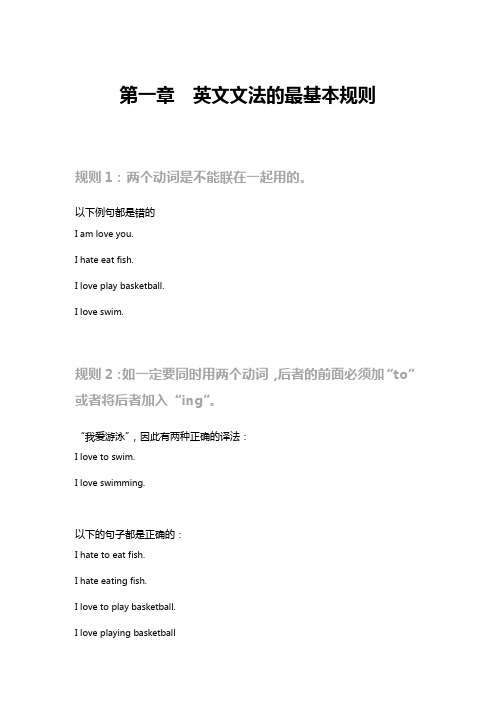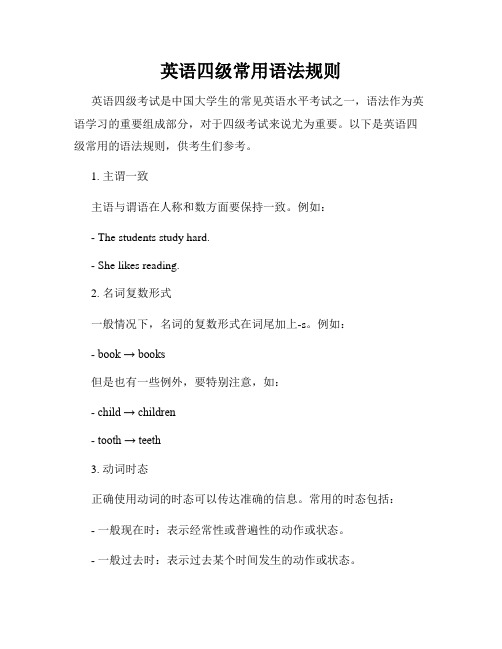专门替中国人写的英语语法(四级)
适合中国人的英语语法

第一章英文文法的最基本规则规则1:两个动词是不能联在一起用的。
以下例句都是错的I am love you.I hate eat fish.I love play basketball.I love swim.规则2:如一定要同时用两个动词,后者的前面必须加“to”或者将后者加入“ing”。
“我爱游泳”,因此有两种正确的译法:I love to swim.I love swimming.以下的句子都是正确的:I hate to eat fish.I hate eating fish.I love to play basketball.I love playing basketballI keep going to church.规则3:主词如果是第三人称,现在式及单数,动词必须加s.我们中国人最不容易记得的规则,恐怕就是这一条了,以下的句子都是错的。
He write very well.Jack love playing the violin.Mary swim every day.正确的句子是:He writes very well.Jack loves playing the violin.Mary swims every day.规则4:绝大多数的否定的句子,不能直接加“not”。
我们中文对否定语气,规则极为简单,我们可以说“我不爱你”,但是我们不能说*I not love you.我们也不能说:I not saw that movie.I not like swimming.He not likes playing violin.我们必须用一种助动词来完成否定的句子,以下才是正确的否定句子:I do not love you.I did not see that movie.He does not like playing violin.请注意,在以上的句子中,do和did都是助动词,do是现在式,did是过去式。
英语四级常用语法规则

英语四级常用语法规则英语四级考试是中国大学生的常见英语水平考试之一,语法作为英语学习的重要组成部分,对于四级考试来说尤为重要。
以下是英语四级常用的语法规则,供考生们参考。
1. 主谓一致主语与谓语在人称和数方面要保持一致。
例如:- The students study hard.- She likes reading.2. 名词复数形式一般情况下,名词的复数形式在词尾加上-s。
例如:- book → books但是也有一些例外,要特别注意,如:- child → children- tooth → teeth3. 动词时态正确使用动词的时态可以传达准确的信息。
常用的时态包括:- 一般现在时:表示经常性或普遍性的动作或状态。
- 一般过去时:表示过去某个时间发生的动作或状态。
- 现在进行时:表示现在正在进行的动作。
- 过去进行时:表示过去某个时间正在进行的动作。
4. 状语位置状语可以表示地点、时间、方式等,一般放在句子中间,但有时也可以放在句首或句末。
例如:- He is studying in the library.- Tomorrow, we will have a picnic.- Carefully, she opened the door.5. 定冠词和不定冠词定冠词"the"用于特指某个人或物,而不定冠词"a"和"an"用于泛指。
"a"用于辅音音素开头的单词,而"an"用于元音音素开头的单词。
例如:- a book- an apple- the car6. 形容词和副词的比较级和最高级形容词和副词的比较级和最高级用于表示两者或多者之间的比较。
一般情况下,比较级在词尾加上-er,最高级在词尾加上-est。
例如:- tall → taller → tallest- quickly → more quickly → most quickly7. 及物动词和不及物动词及物动词需要接宾语来完成意思,而不及物动词不需要。
大学英语四级常用语法(1)

大学英语四级常用语法(1)大学英语四级常用语法精选(1)导语:在学习英语中,语法很重要,备考四级时,如果时间充足,不妨多点回顾语法,补全语法知识点,下面是小编收集了一些精选语法,供您参考,希望能帮助到您。
Ⅰ动词(时态,语态,用法,省略,一致性等)时态1)现在完成进行时态 (have/has been + -ing 分词构成): 动作或状态从过去某时开始,继续到现在,可能继续下去,也可能刚刚结束.I’ve been writing letters for an hour.I’ve been sitting in the garden.2)过去完成进行时(由had been + ing分词构成): 过去某个时刻以前一直在进行的动作I’d been working for some time when he called.We had been waiting for her for two hours by the time she came.3)将来完成进行时: 将来某个时刻以前一直在进行的动作.By next summer, he will have been working here for twenty years.In another month’s time she’ll have been studying here for three years.4)将来完成时(由shall/will have + 过去分词构成): 将来某时已发生的事.I shall have finished this one before lunch.They’ll have hit the year’s target by the end of October.语态可以有两种被动结构的类型,例如:He was said to be jealous of her success.It was said that he was jealous of her success.能同时适用于上述两个句型的主动词通常都是表示“估计”,“相信”等意义的动词,常见的有assume,believe,expect,fear,feel,know,presume,report,say,sup pose,understand等.It is supposed that the ship has been sunk.The ship is supposed to have been sunk.担当be supposed to 与不定式的一般形式搭配时往往表示不同的.意义.例如:Why are you driving so fast in this area? You are supposed to know the speed to know the speed limit. (你应该晓得速度限制)双宾语及宾补结构的被动语态双宾语结构的被动语态: 双宾语结构变为被动语态时,可以把主动结构中的一个宾语变为主语,另一个宾语仍然保留在谓语后面,但多数是把间接宾语变为主语.He was asked a number of questions at the press conference.Two days were allowed them for making the necessary preparations.宾补结构的被动语态:She was called Big Sister by everybody.Then he was made a squad leader.He was considered quite qualified for the job.The room was always kept clean and tidy.短语动词Vi + advThe plane took off two hours late.Vi + prepThey looked round the Cathedral.Vi + prep (有被动语态)She’s looking after her sister’s children.The children were always well looked after.Vi + adv + prepI began to look forward to their visits.Vt + O + advSome women choose to stay at home and bring up their children.The children were brought up by their mother.They took him on.Vt + adv + O (无被动语态)I am trying to give up smoking.Vt + O + prepWe talked Donald into agreement.。
英语四级必背万能句型

英语四级必背万能句型(一)1. On the contrary (与所说的)正相反;相反,反之On the contrary,there are some people in favor of tea.相反,仍旧有一些人喜欢喝茶。
But on the contrary, this is clearly stating that they are most likely to be loved.但是如果情况正相反的话,这就清楚地表明他们是最有可能值得你去爱的人。
Nothing wrong with this kind of migration, on the contrary.这种迁移并没有任何错误,实际情况正相反。
On the contrary. I suspect travel narrows the mind.相反,我认为旅行让人的思想变得更狭隘。
He had no desire to amass wealth or become socially prominent. On the contrary, he worked only as much as was necessary to make ends meet.他并不想敛财,也不想成为社会支柱,只想干活挣钱恰好能过日子就行。
2. As for as I am concerned 对于我个人而言As for as I am concerned,I agree with the latter opinion to some extent. 就我个人而言,我同意后者的意见。
I went shopping with my girlfriend, but was bored and restless. As far as I amconcerned, it was for the birds !我和我的女友去逛街,不过又无聊又令人烦躁。
就我的观点来看,那真是无聊透顶的事了!For Beijing the same as far as I am concerned, she's changing the face of rapiddevelopment, I love her, as well as into my blood.北京对于我而言就等于家,面对她的日新月异,快速的发展,我对她的热爱已经融入了我的血液里。
四级翻译语法汇总(全)

虚拟语气用于状语从句
一. 虚拟语气用于条件状语从句
1.主句与从句的构成
条件状语从句 与过去事实相反 与现在事实相反 had done were / did 主句
would / should / could / might + have done
would / should / could / might + do would / should / could / might + do
6。 用于虚拟语气的条件从句中。
•在虚拟语气条件句中从句谓语动词有were, had, should 等词,可将if 省略,把 were, had, should 移到主语之前, 采取部分倒装。 •Were it to rain tomorrow, the football match would be put off. • Had you put on more clothes, you wouldn’t have caught cold. • Should Mr. White call, what would you say?
在英语中,主语和谓语有两种顺序: 一是主语 在前,谓语在后,称为自然语序( Natural Order ). 反之,如果谓语在主语前面,就是倒装语序 ( Inverte了强调。
全部倒装 Full Inversion
倒装语序 部分倒装 Partial Inversion
Examples
• I would rather they came tomorrow. • I would rather you had gone there yesterday. • I could go myself but I would rather you went this afternoon.
英语四级语法万能规则

英语四级语法万能规则1.时态规则一般现在时:表示经常性的行为、惯或客观真理。
如:I often go to the gym.现在进行时:表示现在正在进行的动作。
如:___.一般过去时:表示过去发生的动作或状态。
如:I visited my grandparents last weekend.过去进行时:表示过去某个时刻正在进行的动作。
如:They ___ it started raining.将来时:表示将来发生的动作或存在的状态。
如:I ___.2.语态规则主动语态:主语执行动作。
如:He built a house.被动语态:主语接受动作。
如:The house was built by him.3.名词规则可数名词:指可以用数目词(one。
two。
three。
etc.)修饰的名词。
如:There are three apples on the table.不可数名词:指不能用数目词修饰的名词。
如:I need some milk.可数名词的复数形式:一般在名词后加-s。
如:The book is on the shelf。
The books are on the shelves.4.代词规则人称代词:用于表示人的代词。
如:I。
you。
he。
she。
etc.物主代词:表示所有关系的代词。
如:my。
your。
his。
her。
etc.反身代词:表示动作反身的代词。
如:myself。
yourself。
himself。
etc.5.形容词规则形容词位置:一般位于名词前面修饰名词。
如:a beautiful flower。
an interesting book.形容词的比较级和最高级:一般在形容词后面加-er表示比较级,___表示最高级。
如:taller。
tallest.6.副词规则副词位置:可放在句子中的不同位置修饰动词、形容词、副词或整个句子。
如:___.副词的比较级和最高级:一般在副词前面加-more表示比较级,___表示最高级。
大学英语四级语法指导
大学英语四级语法指导大学英语四级语法指导篇一:大学英语四级语法指导倒装:倒装有全部倒装和部分倒装。
谓语部分所有单词都放在主语前是全部倒装。
谓语的一部分放在主语的前面是部分倒装。
谓语中的一部分通常是指:1、系动词;2、助动词;3、情态动词。
全部倒装的五条原则:1. There be句型(表示有);2. 以There或now开头的句子,且句子谓语动词为come或go;There you go again. 你又去那里了。
3. 以Here开头的句子,且句子谓语动词为系动词be; Here you are. 拿去。
4. 以副词out, in, up, down, away开头的句子;在2、3、4前提下,如果句子的主语是代词则用陈述句语序。
5. 以状语(常见的是地点状语)开头的句子。
例题:1. I like watching TV _C_ to the cinema.A more than to goB than goingC more than goingD rather than to gothan 除构成固定短语外就要与比较级搭配,不会单独出现; rather than + 动词原形;平行结构,遇到平行结构时应做的两步:2. I would appreciate _B_ it a secret.A you to keepB your keepingC that you keepD that you will keepyour keeping 动名词的复合结构。
you keeping 也是正确的。
3. I hope my teacher will take my recent illness into _C_ when judging my examination.A regardB countingC accountD observationtake sth. into account 考虑。
4. Important people don’t often have much free time as their work _C_ all their time.A take awayB take overC take up [占据]D take in找出连接词,2 使要填部分与已给出的对应部分形式完全一样。
大学英语四级考试-之-段落翻译
评分标准:
本题满分为15分,成绩分为六个档次:13-15分、10-12分、7-9分、4-6分、1-3分和0分。各档次的评分标准见下表:
档次
评分标准
13-15分
译文准确表达了原文的意思。用词贴切,行文流畅,基本上无语言错误,仅有个别小错。
10-12分
译文基本上表达了原文的意思。文字通顺、连贯,无重大语言错误。
When Chinese people say they have little talent or learning, it is motivated by their awareness of the limits of their knowledge, and their fear that they cannot satisfy.
Liquor has been used since ancient times in ceremonies and sacrifices.
Tea is often classified into green tea, black tea and flower tea, each with its own taste.
2.增添主语
例: 1. 要更好地了解中国,可以有很多视角。 2. 中国历史上产生了许多杰出的哲学家、思想家、政治家、军事家、科学家和文学艺术家,留下了浩如烟海的文化典籍。
In its history China has produced many outstanding philosophers, thinkers, statesmen, strategists, scientists, writers and artists and left us numerous volumes of literature.
英语 专业四级 词汇语法辅导
第一讲:分词独立结构1.分词作状语时的逻辑主语少数情况下,其逻辑主语与句子主语不一致,分词用来修饰全句。
Judging from appearance, he seems to be a strong man. (=If we judge…) Generally speaking, the novel is not very inspiring.上述结构只限于为数不多的几个动词,比如:broadly speaking; considering; talking of; putting it mildly(说得客气一点); regarding(touching, respecting) the plan(关于这个计划); including…; pending the trial(在审讯期间); excluding the captain(不包括船长); barring accidents(若无意外); granting that(即使); strictly speaking; comparatively speaking; roughly speaking; calculating roughly; calculating strictly; taking all things into consideration(从各方面来说); properly speaking等。
一般情况下,作状语的分词的逻辑主语就是句子的主语。
2.分词的独立结构作状语的分词的逻辑主语和句子的主语不一致,分词就应有自己的逻辑主语,这就构成了分词的独立结构。
独立结构一般在句首,也可在句尾,表伴随情况常在句尾。
其结构由逻辑主语(名词、代词)+分词构成,可表示时间、原因、条件、方式或伴随情况等。
在独立结构中,其逻辑主语可以是分词动作的执行者,也可是承受着;可以是现在分词,也可是过去分词,还可是分词的完成式或被动式。
1)逻辑主语+现在分词:这种结构表示主动意义。
12月大学英语四级语法考点复习:人称代词
12月大学英语四级语法考点复习:人称代词人称代词概说表示"我',、"你"、"他"、"我们"、"你们"、"他们"等的词,叫做人称代词。
人称代词的用法1)人称代词主格的用法a)作主语I am a cook.(炊事员) We are cooks,You are a teacher.(教师) You are teachers.He is a barber.(理发员) The yare barbers.She is a nurse.(护士)The yare nurses.It is a cart.(大车) They are carts.b)作表语It's I .是我。
Oh,it's you. 噢,是你。
[注一]第一人称单数人称代词I (我)永远要大写。
(见上面例句)[注二]口语习惯上不说it's I (he, she等),而说It's me (him,her等)。
2)人称代词宾格的用法a)作及物动词的宾语The dog bit him.那只狗咬了他。
Our P. T. teacher taught us to swim yesterday.我们的体育老师昨天教我们游泳。
This is my new hat. Do you like it 这是我的新帽子,你喜欢吗b)作介词的宾语My brother often writes tome.我弟弟常给我写信。
They took good care of us.他们无微不至地照料我们。
3)人称代词的其他用法各人称代词除按照自身的人称、数和格使用外,还有下列一些特殊用法:a)报刊的编辑和文章的作者,在发表观点时,常用we代替I (同样用our代替my)。
如:We believe that China will make still greater progress inshipbuilding.我们相信中国的造船业将会有更大的发展。
- 1、下载文档前请自行甄别文档内容的完整性,平台不提供额外的编辑、内容补充、找答案等附加服务。
- 2、"仅部分预览"的文档,不可在线预览部分如存在完整性等问题,可反馈申请退款(可完整预览的文档不适用该条件!)。
- 3、如文档侵犯您的权益,请联系客服反馈,我们会尽快为您处理(人工客服工作时间:9:00-18:30)。
专门替中国人写的英语语法 第一章 英文文法的最基本规则 英文和我们中文最大的不同,是在动词,我们中文的动词很简单,没有所谓的第几人称,也没有复数和单数之分,更没有过去式或进行式,英文可不同了,凡是用动词的时候,必须注意很多很多的规则,一旦弄错了,常常是犯了大错。 在这一章,我要将英文最基本的规则一一列下。这些规则都是我们中国人所常常不注意的。 为了不要误导读者,凡本书内错误的句子前面都有〝*〞的符号。 规则(1):两个动词是不能联在一起用的。 在中文,我们常说“我是爱你的”,翻成英文,这就变成了 * I am love you. 滑稽的是,这句英文句子犯了大忌,因为〝am〞是动词,〝love〞也是动词,两个动词是不能联在一起用的。这句话的正确说法是: I love you. 或者 I am in love with you. 我们中国人也会说〝我喜欢看电视〞,翻成英文,这变成 * I love watch television. 这个句子也犯了同样的错。 以下几个句子都是错的,因为这些句子中都有两个动词连在一起的情形: * I hate eat fish. * I love play basketball. * I love swim. 如果你一定要讲“我爱游泳”,怎么办呢?请看以下的规则。 规则(2):如一定要同时用两个动词,后者的前面必须加“to”或者将后者加入“ing”。 “我爱游泳”,因此有两种正确的译法: I love to swim. I love swimming. 以下的句子都是正确的: I hate to eat fish. I hate eating fish. I love to play basketball. I love playing basketball I keep going to church. 规则(3):主词如果是第三人称,现在式及单数,动词必须加s. 我们中国人最不容易记得的规则,恐怕就是这一条了,以下的句子都是错的。 * He write very well. * Jack love playing the violin. * Mary swim every day. 正确的句子是: He writes very well. Jack loves playing the violin. Mary swims every day. 规则(4):绝大多数的否定的句子,不能直接加“not”。 我们中文对否定语气,规则极为简单,我们可以说“我不爱你”,但是我们不能说 * I not love you. 我们也不能说: * I not saw that movie. * I not like swimming. * He not likes playing violin. 我们必须用一种助动词来完成否定的句子,以下才是正确的否定句子: I do not love you. I did not see that movie. He does not like playing violin. 请注意,在以上的句子中,do和did都是助动词,do是现在式,did是过去式。 关于现在式和过去式,究竟是怎么一回事,以后我们会解释清楚的。 助动词不限于“do”和它的变型,can、will、would、shall、may、must等等都是助动词,因此,以下的英文句子又都是对的: He can not swim. They will not go to church tomorrow. Mary should not go to the party. I shall not see you. He may not go out tonight. He must not eat meat any more. 规则(5):在不定词“to”的后面,必须用原形动词 英文中的动词,是会变化的,以have为例,第一人称和第三人就不同: I have a dog. He has a dog. 如果是过去式,动词又要变化。have的过去式是had,不论第几人称,一概都要用had。 几乎每一个英文动词的过去式都有变化,以下是几个例子: 现在式 过去式 go went come came eat ate play played swim swam 不论那一个动词,都有一个原形动词,一切都是从这个原形动词变出来的,像go、drink、have、walk、love、like等等都是原形动词。 如果我们有必要要用不定词to,就必须用原形动词,例如to go、to drink、to have,都是正确的,*to went;*to drank;*to loved等等都是错的。 英文中有一个动词最为麻烦,那就是am、are、is、was、were等等,翻译成中文,这都是,而这些动词的来源都是be,所以我们说这些动词都是verb to be。 以下的句子都用上了〝be〞 I want to be a teacher. He wants to be a good father. They all love to be rich. No one likes to be poor. 规则(6):英文中有所谓的助动词。必须注意 英文中有很多动词都是助动词,在规则(4)中,我们说在绝大多数的否定语句中,必须用助动词do或did。Do是原形动词,did 和does都是do的变形。 除了do是助动词以外,can、may、might、will、would、must也都是助动词。 以上所提到的助动词,都有一个共同的特色,那就是这些助动词后的动词必须是原形动词,以下的句子都是正确的: He can swim. He does not swim. I do not speak English. You must walk to work every day. I did not work yesterday. You may leave now. I will go to Taipei tomorrow. 以下的句子都是错的: * I did not went. * He does not goes to work. * You must walked to work. 除了以上的助动词以外,还有一个非常特殊的助动词,那就是have,在这个助动词的后面,动词绝对不能用原形动词,以下是用这个助动词的例子: I have been to England. I have slept all day. I have studied English since I was a child. been、slept 和studied都是过去分词(past participle),以下的句子也都是现在完成式,我们后讨论完成式的时候,会将这些解释清楚的。 规则(7):英文问句要有助动词 我们先看看以下的英文句子,这些都是错的: * How many books you wrote? * How many sons you have? 正确的句子是: Why do you drink so much water? How many books did you write? How many sons do you have? 绝大多数的英文问句子是一定要有助动词,以下全是正确的英文问句,你可以看出每一句的助动词吗? Do you love me? Did you go to school yesterday? How many books do you have? How much money does he have? Why don’t you go back home? Do you like to swim? Can you play violin? Will you go home tomorrow? Would you give me a call? 当然啦,一旦动词是verb to be,我们又不需要助动词了,以下都是正确的英文问句: Are you a teacher? Is he a student? Is Mr. Chang your father? Were your mother and father in England last year? 规则(8):特殊动词随主词的变化 英文中,有些动词因主词不同而改变,verb to be是其中之一,因此,我们必须记得以下的规则: 第一人称 第二人称 第三人称
现在式 单数 I am You are (He,She,It)is 复数 We are You are They are
过去式 单数 I was You were (He,She,It)was 复数 We were You were They were Verb to have也有类似的变化: 第一人称 第二人称 第三人称
现在式 单数 I have You have (He,She,It)has 复数 We have You have They have
过去式 单数 I had You had (He,She,It)had 复数 We had You had They had 【练习一】 以下的句子都有错,请将正确的句子写出来: 1.* I am like my parent. I like my parent 2.* He is loves his teacher. He loves his teacher 3.* He keeps swim every day. He keeps swimming every day 4.* He wants drink a glass of water. 5.* He likes play violin. 6.* Jack do not love mathematics. 7.* Mary hate singing. 8.* My mother cook very good food. 9.* He want me to see him tomorrow. 10.* He not knows my name. 11.* I not like you. 12.* He not like swimming. 13.* You not went home. 14.* I not like swimming. 15.* I wanted to went to my mother’s home. 16.* I do not like to swimming. 17.* I did not ate dinner. 18.* I will not went home. 19.* He did not went home. 20.* You may leaving now. 21.* He can swimming. 22.* He does not goes to work.
